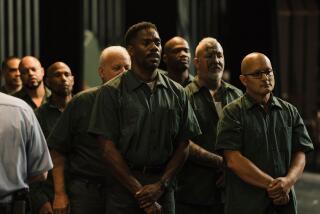David Seidler, ‘The King’s Speech’ writer, and his commoner cause
David Seidler may have struggled with a profound stutter as a child, but he’s recovered with a vengeance. Discussing his script for “The King’s Speech,” a pet project he pursued over decades and through a cancer bout (he’s now in remission), he talks in long, uninterrupted paragraphs, with nary a hiccup to betray his former difficulties.
Born in England and raised in the U.S. — he maintains dual citizenship — Seidler gravitated to the story of George VI (played by Colin Firth), known to his family as Bertie, whose paralyzing stutter was minimized with the help of Australian speech therapist Lionel Logue (Geoffrey Rush), because it dramatized the conflict between the crown and its erstwhile colonies. After generating ferocious buzz at Telluride, “The King’s Speech” became an awards frontrunner, giving Seidler his highest-profile project since Francis Ford Coppola filmed his script for “Tucker” in the mid-1980s.
What piqued your interest in the story of George VI?
It began, obviously, by the fact that I was a stutterer as a kid — truly a profound stutterer. I grew up always having a great soft spot in my heart [for him], because I knew he was a stutterer, who had, if not been totally cured, at least improved to the point where he could give these very eloquent, moving, stirring wartime speeches.
It wasn’t public knowledge that he worked with a speech therapist. How did you find that out?
I started researching Bertie, and every once in a while, there was this blip on the radar screen called Lionel Logue. The royal family doesn’t like talking about the royal stutter. It’s an embarrassment, and it’s swept under the carpet — even today, but much, much more then. So I asked a friend in London to do a little detective work for me, which I think consisted of looking in the telephone directory, and they came up with a surviving son, Valentine Logue. He said, “Yes, yes, yes, come to London. I’ll talk to you and I have all the notebooks that my father kept while treating the king.” This was the mother lode. But there was a little caveat. He said, “I’ll do this, but you must get written permission from the Queen Mum.” So I wrote to the Queen Mum, and she wrote back, “Please, not in my lifetime. The memory of those events is still too painful.” And when the Queen Mum says to an Englishman, “Wait,” an Englishman waits. I didn’t figure I’d have to wait this long.
You use the film to illustrate a paradigm shift from an era when royalty were seen and not heard to one where they were expected to be on the radio and in people’s lives.
Before the invention of radio, it was enough that they were these supreme, remote figures, who you saw at a distance over the heads of thousands of people, and they had great plumes on their heads so you knew which one was the king. That was enough. As a common man, you never heard the king speak. And then suddenly, you not only heard him speak, but you could hear him in your living room, in the privacy of your home where you could comment rudely about him. Big difference.
Lionel Logue insists on that kind of intimacy. He refuses to call his client anything but “Bertie,” and he ignores his desire to avoid talking about the past.
This was based on what I was able to glean about Logue’s techniques. Not a lot is written, but there’s enough to put it all together. The two words that kept coming across with him are charismatic and confident. He was apparently an extraordinarily charismatic man with huge confidence — not only self-confidence, but confidence in you. He never said, “I can cure your stutter.” It was, “You can cure your stutter. I’ll supply some tools to help you do this. But you are going to cure yourself.” And that, of course, really required a direct bond.
It’s as much to do with psychology as with speech therapy.
I could never categorically prove that Logue read Sigmund Freud, but I knew perfectly well that he was using the talking cure. I have a very elderly and somewhat eccentric uncle, and he has a pied-à-terre in St. John’s Wood. At an early stage of this project when I was doing it on my own dollar, to reduce costs, he let me stay in his flat, so he became familiar with the project. Shortly before filming was to commence, he said, “That fellow in your script, Australian, wasn’t he?” Yes, yes, you know he was. You read the script. “Name was Logue, wasn’t it?” Yes, yes. “I saw him for years.” My jaw dropped. My uncle had been a stutterer. It runs in my family. He said, “Yes, your grandfather, my father, wanted me to be treated by the king’s physician. So he sent me to see this fellow Logue.” I said, “What was it like? What were the sessions like?” He said, “The man was an Australian gangster. All he wanted to do was talk about my childhood. Absolute rubbish.” I said, “Yes, but you don’t stutter any more.” He said, “I would have grown out of it anyway.”
More to Read
The biggest entertainment stories
Get our big stories about Hollywood, film, television, music, arts, culture and more right in your inbox as soon as they publish.
You may occasionally receive promotional content from the Los Angeles Times.










